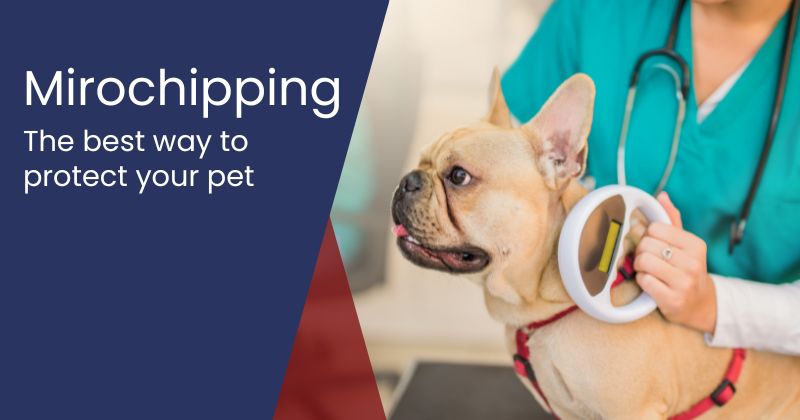
Pet owners want to provide the best care and security for their beloved animals, and pet microchipping is a simple and effective way to ensure their safety. A microchip significantly increases the chances of reuniting with your pet if they get lost or separated from you. Although collars and ID tags are useful, they can easily fall off or get damaged, leaving your pet without proper identification. Microchipping provides a permanent form of identification that remains with your pet, no matter what happens. This blog dives into the importance of pet microchipping and why every pet owner should consider this essential step.
Pet microchipping involves implanting a small electronic chip, about the size of a grain of rice, beneath your pet’s skin. Typically placed between the shoulder blades, the chip contains a unique identification number. When scanned by a veterinarian or animal shelter, this number is linked to your contact information in a national database. Unlike collars or tags, the microchip won’t fall off or fade over time, making it a reliable option for lifelong identification.
The microchipping procedure is quick and relatively painless. Your veterinarian uses a syringe to inject the microchip under your pet's skin, similar to a routine vaccination. Most pets don't experience any discomfort beyond the initial prick, and the chip stays in place without requiring maintenance. Once implanted, the microchip must be registered in a pet recovery database. This ensures that if your pet is found, the chip can be scanned, and your contact information will be available to reunite you with your pet.
Pet microchipping plays a crucial role in reuniting lost pets with their owners. According to the American Veterinary Medical Association, dogs with microchips are returned to their owners at a significantly higher rate compared to those without chips. Cats benefit even more, as their chances of being reunited are even slimmer without microchipping. Microchipping offers peace of mind, knowing that your pet has a reliable form of identification if they are ever separated from you.
Statistics reveal that the return rates for lost pets are much higher when they are microchipped. For dogs, the return-to-owner rate is about 52% when microchipped, compared to just 22% for non-microchipped dogs. Cats experience an even greater benefit, with microchipped cats being returned at a rate of 38% compared to only 2% for those without. These numbers highlight the importance of pet microchipping, especially for cats, who may wander far from home.
Unlike a collar or ID tag, which can break or slip off, a microchip provides a permanent solution for identifying your pet. Whether your dog slips out of its collar or your cat goes missing without a tag, the microchip stays in place and can be scanned by shelters or veterinarians. This permanent identification ensures your contact information is always accessible in the event your pet gets lost.
Some pet owners hesitate to microchip their pets due to misinformation or concerns about the process. Let's address a few common myths to help you understand the truth about microchipping.
Some people worry that microchipping is painful for their pet, but this isn't the case. The microchipping procedure is quick, minimally invasive, and similar to a routine vaccination. Most pets don’t feel anything beyond the small prick of the needle, and they recover immediately after the procedure.
Microchips don’t have tracking capabilities. They only store a unique ID number that can be linked to your contact information when scanned. If you're looking for GPS tracking, you’ll need to explore other devices, such as a collar-based tracker.
Microchips are designed to last a pet's lifetime. Once implanted, they require no maintenance and don’t wear out over time. It's essential, however, to ensure your contact information in the registry is up to date. If you move or change phone numbers, updating the database is crucial to reuniting with your pet if they go missing.
While pet microchipping is an excellent tool, it’s most effective when used alongside traditional forms of identification, like collars and tags. Combining these options ensures your pet has the best chance of being identified quickly.
ID tags are a visible way for someone to identify your pet and contact you immediately without the need for scanning. However, tags can fall off or become unreadable over time. That’s why it’s important to always have a reliable backup. Pet microchipping offers that long-term solution, providing peace of mind that even if a collar is lost, your pet can still be identified.
Most animal shelters and veterinary clinics now routinely check found pets for microchips. If your pet is lost and brought to a shelter, the staff will scan for a chip, and if one is found, they can quickly contact you. This makes microchipping an essential part of any pet recovery plan.
Registering your pet’s microchip is a vital step in ensuring it works effectively, but it doesn’t stop there. Over time, your contact details may change. Whether you move to a new home, switch phone numbers, or update your email address, it’s important to keep your pet’s microchip information current.
If your contact information is outdated, the microchip can’t help bring your pet home. Many pet owners forget to update the database after moving or changing phone numbers, rendering the chip essentially useless. A quick call to the registry or an online update ensures your information is current, making it easier for shelters and vets to contact you if your pet is found.
Updating your information is easy and can be done online through the company that manages your pet’s microchip. Some registries also send reminders when your details haven’t been updated in a while. Make it a habit to check your pet’s microchip registration annually, especially after any significant life changes.
The cost of pet microchipping is relatively low, especially considering the peace of mind it provides. Many pet owners mistakenly believe that microchipping is expensive, but in reality, it’s a one-time fee, often ranging from $25 to $50. When you weigh this cost against the emotional and financial burden of losing a pet, the value of microchipping becomes clear.
Microchipping offers pet owners peace of mind, knowing that they have taken a reliable step to protect their pets. Pet microchipping is essential to your pet’s safety, especially when the chances of reuniting with a lost pet increase so significantly. No matter how careful you are, accidents can happen and it’s possible that your pet may wander away from you. Microchipping gives you an added layer of security, so you can rest assured knowing your pet has a significantly higher chance of being returned to your arms. Take the step to protect your pet by scheduling a microchipping appointment at Rockdale Animal Hospital. Call (770) 922-8600 or request an appointment online to discuss microchipping and other ways to ensure your pet stays safe.


